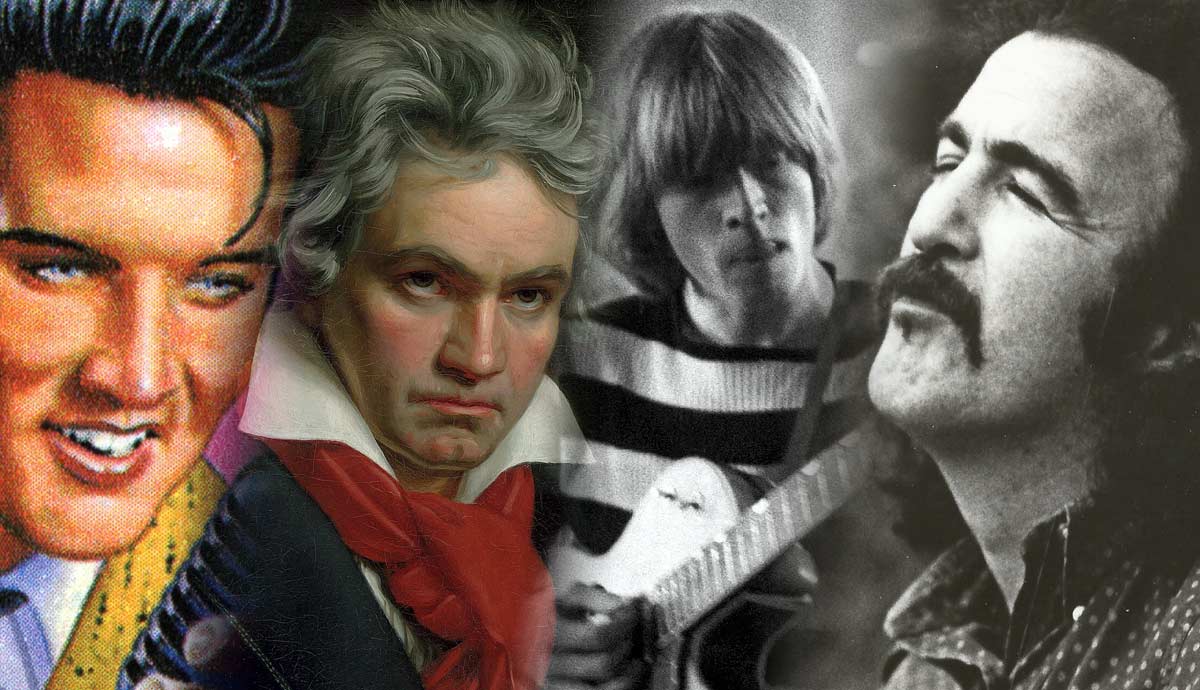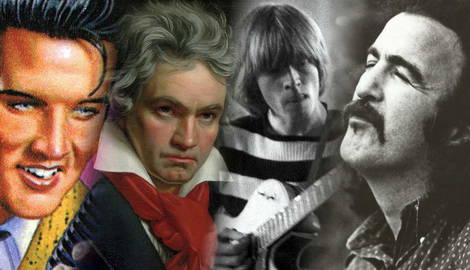
Music of all genres has garnered fans and attention the world over. Musicians have become the center of media attention, adored by thousands, sometimes millions, of fans. Even with all this time in the spotlight, enduring mysteries have found their way into the world of music. Despite all of the focus on famous bandleaders, some puzzles remain unsolved. What are some of history’s most persistent unsolved historical enigmas?
1. Who Shot Bob Marley?

Ironically, Reggae legend Bob Marley was practicing his iconic “I Shot the Sheriff” with his band when a group of masked gunmen entered his home and tried to kill him. On December 3, 1976, seven unknown assailants drove into the gates of Marley’s home studio. Marley’s wife Rita was shot in the head as she sat in her car in the driveway on her way to run an errand (she survived the scalp wound).
The gunmen entered the building and fired at Marley, who was pulled down to the floor by his manager and a band employee. Marley was hit in the arms, his manager in the legs, and employee Louise Taylor in the torso. The gunmen fled immediately, leaving four injured individuals who would all survive.
The shooters were apprehended, tried, and executed. However, Marley himself stated in later interviews that the men who shot him were never caught or tried by “a court or police.” Before his execution, one of the shooters claimed that the CIA had hired the group to kill Marley in exchange for drugs and weapons. Jamaica was in political upheaval at the time, with high poverty rates and strife abound. Marley was a controversial figure in both Jamaica and the US, supporting left-wing politics, marijuana use, and other divisive topics. It came as no surprise that he would be a potential target for assassination, but just who was out to get him remains a mystery.
2. What Is The “Last Mystery” of Elvis?

In 1954, Elvis Presley was nineteen years old and on the cusp of an incredibly successful music career. Getting his start at Sun Records under producer Sam Phillips, Elvis began recording and garnering lots of attention from adoring fans. One of his early tracks was a cover of a song called “Without You,” a song that Phillips had acquired, thinking it would be perfect for his soon-to-be superstar. Elvis sang the track but marveled at the original singer’s golden voice, stating, “I hate him—why can’t I sing like that?”
Just who was the owner of those smooth vocals? To this day, it remains a mystery.
In fact, Elvis fans deem it “the last mystery” in the Elvis canon. Phillips claimed he purchased the track from another record company, Nashville Peer-Southern Music. However, the songwriters of “Without You” claimed that this was not the case and it may have come from the Nashville State Penitentiary. Phillips had been working there with a group of inmates who sang, calling themselves the Prisonaires. Was the voice of “Without You” that of a convict who had more potential than The King himself?
3. What Happened to Richey Edwards?

The Manic Street Preachers was a Welsh rock band that came onto the scene in the late 1980s. Formed by a group of students at Oakdale Comprehensive School, the group soon added guitarist Richard “Richey” Edwards to their lineup.
The band released two albums in the early 1990s that charted in the top 20s in the UK, but despite this success, Edwards struggled with his mental health. He spent time in a psychiatric institution in 1994, and struggled with an eating disorder and alcoholism. Edwards often dealt with his private turmoil publicly, with his struggles inspiring songs and discussed openly in interviews.
On February 1, 1995, due to fly to the US for a promotional tour with the band, Edwards checked out of his hotel at 7 AM, taking his wallet, keys, passport, and medication with him. He was never seen again.
Two weeks after his disappearance, his car was recovered, abandoned at a service station. The station was close to the Severn Bridge, a location heavily associated with suicide. Some assumed that the troubled star had taken his own life, but soon, sightings of Edwards began coming in from all over the world.
While these might be simply dismissed as wishful thinking, another event adds a twist to the case. Richey’s uncle went “off the grid” in the 1960s and 1970s, only to reappear. This interested Richey as a child, and some wondered if he had followed in his uncle’s footsteps. Is Edwards traveling the world? Or did he indeed succumb to his demons?
4. Where Is Jim Sullivan?

Known as “Sully” to his friends, Jim Sullivan was a classic Californian folk singer of the psychedelic era. He released two albums, one in 1969 and one in 1972, and ran with the Hollywood social circle, including Dennis Hopper. Still, his album sales were mediocre, and he headed east to Nashville in 1975 in hopes of more promising opportunities before sending his family to join him.
Four days after he left, his car was discovered just south of Santa Rosa, New Mexico. His beloved twelve-string guitar was in the passenger seat, which clearly indicated to Sullivan’s family that something was wrong. They knew Jim would never leave his guitar behind and feared foul play. No sign of Sullivan or his body was ever located despite an extensive search by his family and volunteers. Theories abounded, including an alien abduction, Mafia hit, suicide, or murder by the police.
5. Did Brian Jones Drown?

Called “The Original Ringleader” of the Rolling Stones by some, Brian Jones lived rock & roll. A flashy dresser who partied hard and rocked harder, Jones believed in the band from the start. Despite his incredible contributions as guitarist and founding member, Jones departed from the Stones in 1969.
Though the official explanation was that he wanted to make his own music, increasing struggles with drugs and alcohol had begun to impact his performance and reliability. Just months after his departure from the band, 27-year-old Jones was found lifeless in a swimming pool at his home, Cotchford Farm, in East Sussex, UK.
His cause of death was attributed to drowning, likely as a result of a drug-induced stupor and accidentally falling into the pool. He had hosted a party the night before that had featured alcohol and hashish, and the coroner found that his liver was twice the weight of a normal one, indicating ongoing alcohol issues. The case of Jones’ death was seen as open and shut by the authorities, but it didn’t take long for Jones’ friends and acquaintances to start murmuring otherwise.

Some believed that Jones had been murdered. A construction worker who was renovating Jones’ estate at the time had a financial dispute with the guitarist the day he died and was postulated as a potential suspect. Thomas Keylock, Jones’ manager, was considered a possible suspect but was never questioned by authorities. He was among the first to arrive on the scene as Jones was pulled from the pool.
Allegedly, the construction worker, Frank Thoroughgood, made a deathbed confession in 1993, “it was me that did Brian, I just finally snapped.” Though this statement cannot be verified, it is featured in a 1994 book by author Terry Rawlings that presents the theory of Jones’ murder.
Though Brian Jones’ death has never been looked at as a murder case, the circumstances of his death have been reviewed by the Sussex Police in 1984, 1994, and 2009. They maintain that through the years, no new evidence has emerged to suggest that the original coroner’s ruling was incorrect. Still, in addition to Rawlings’s book, documentaries, investigative reporting, and other novels believe otherwise.
6. Who Was Beethoven’s “Immortal Beloved”?

Ludwig van Beethoven was one of the most influential composers of the 18th and early 19th centuries. As he began to suffer symptoms of impending deafness at age 26, the musician began furiously creating as much music as he could, impacting his contemporaries and the history of music at large. Among his most famous works are the Fifth Piano Concerto, his Ninth Symphony, and Symphony No. 3.
Beethoven died in 1826, leaving his home of Vienna shut down as the populace mourned his loss. An enigmatic individual who never married and had interesting quirks, Beethoven continued to fascinate music fans in the centuries after his death.
Not only did he elevate instrumental music in world culture, he was an intriguing and interesting character. A letter came to light after Beethoven died, and it has remained one of the most persistent mysteries relating to man. A love letter addressing the receiver as his “Immortal Beloved” has left fans scratching their heads as to just who this person could be.
The letter begins “My angel, my all” and is very clearly romantic in nature. There were no known lovers in Beethoven’s life at the time the letter was written, and the identity of the intended receiver remains a mystery. The story even inspired a 1994 movie, Immortal Beloved, starring Gary Oldman as Beethoven. The movie suggests that Beethoven’s sister-in-law, Joanna, was the object of his affections, but the documented dislike between the pair in reality leaves the mystery’s status firmly unsolved in most minds.










